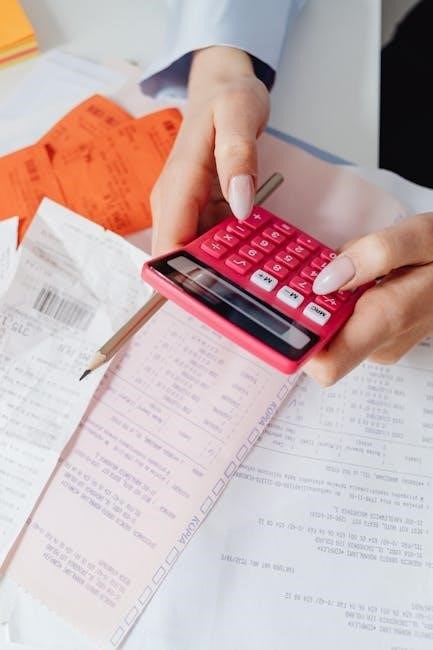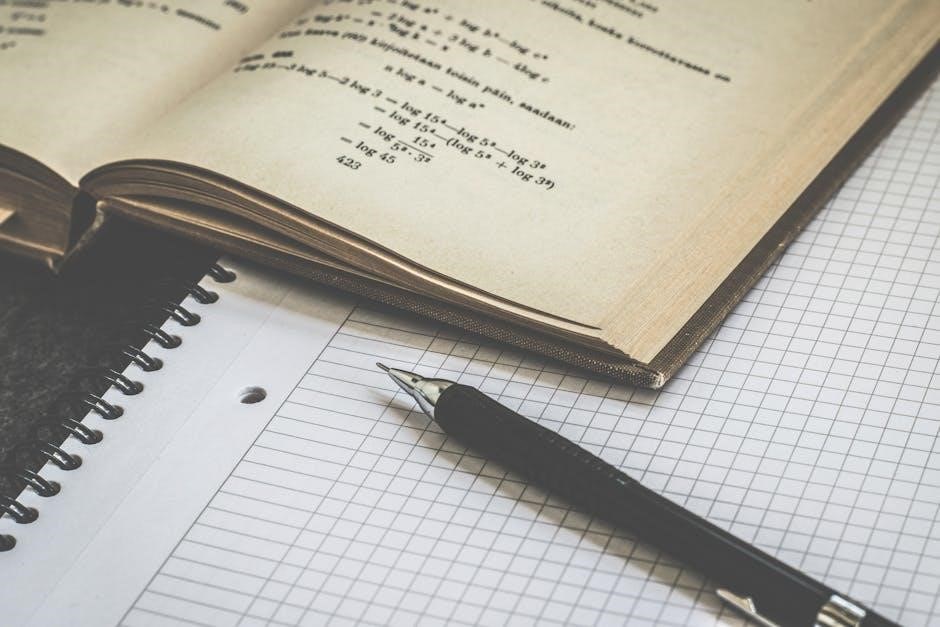Grade 7 math workbooks provide structured practice, covering essential topics like ratios, geometry, and algebra. They offer exercises, problem-solving strategies, and answer keys for self-assessment and improvement.
Overview of Grade 7 Math Curriculum
Grade 7 math curriculum focuses on building foundational skills in key areas such as ratios, proportional relationships, and the number system. Students explore operations with integers, fractions, and decimals, emphasizing practical applications. Geometry and measurement concepts, including perimeter, area, and volume, are introduced to enhance spatial reasoning. Basic algebraic thinking is also integrated, with an emphasis on solving linear equations and understanding variables. The curriculum is designed to deepen problem-solving abilities and prepare students for more complex math in higher grades. Critical thinking and real-world applications are highlighted to foster a strong mathematical mindset.
Importance of Using Math Workbooks for Grade 7 Students
Grade 7 math workbooks are essential tools for reinforcing learning and improving math skills. They provide structured practice exercises that align with curriculum standards, helping students master key concepts like ratios, geometry, and algebra. Regular use of workbooks enhances problem-solving abilities and critical thinking. Workbooks also offer a self-paced learning environment, allowing students to review challenging topics independently. Additionally, they build confidence and fluency in math through consistent practice. Answer keys and feedback mechanisms enable students to assess their progress and identify areas for improvement, fostering a deeper understanding of mathematical principles and their practical applications.

Key Chapters in a Grade 7 Math Workbook
Grade 7 math workbooks typically cover ratios, proportional relationships, the number system, operations, basic geometry, measurement, and an introduction to algebraic thinking, ensuring comprehensive skill development.
Ratios and Proportional Relationships
Ratios and proportional relationships are foundational concepts in Grade 7 math, focusing on comparing quantities and understanding constant rates. Students learn to express ratios as fractions, identify equivalent ratios, and solve problems involving proportional reasoning. These skills are essential for real-world applications, such as scaling recipes, calculating distances, or mixing ingredients. Through practical exercises, students develop critical thinking and problem-solving abilities, ensuring a strong grasp of these mathematical principles. This chapter builds a bridge to advanced math topics, emphasizing the importance of proportional relationships in everyday situations and future academic pursuits.
The Number System and Operations
The number system and operations chapter in Grade 7 math workbooks focuses on developing a deep understanding of integers, positive and negative numbers, and exponents. Students explore operations involving multi-digit numbers, decimals, and fractions, refining their arithmetic skills. The workbook includes exercises on properties of operations, such as commutative and associative properties, and applies these to solve real-world problems. This section builds on earlier math skills, ensuring students can perform calculations accurately and efficiently, while introducing concepts that lay the groundwork for algebra and higher-level mathematics.
Practicing these operations helps students develop number sense and problem-solving strategies, essential for future academic success.
Basic Geometry and Measurement
The basic geometry and measurement section in Grade 7 math workbooks introduces students to fundamental concepts of shape properties, angles, and spatial reasoning. Exercises focus on calculating perimeter, area, and volume of various shapes, including triangles, rectangles, and prisms. Students also learn to convert between different units of measurement and understand the relationships between them. Practical problems involve applying these skills to real-world scenarios, such as determining the area of a room or the volume of a container. This chapter emphasizes visual learning through diagrams and hands-on activities, helping students build a strong foundation in geometric principles and measurement skills.
Mastering these concepts is essential for advancing in geometry and applied mathematics.

Grade 7 math workbooks introduce algebraic thinking through structured lessons and exercises. Students learn to solve simple equations, understand variables, and recognize patterns. These workbooks emphasize logical reasoning and problem-solving skills, preparing students for more advanced algebra. Exercises include translating word problems into algebraic expressions and solving one-step and two-step equations. Visual aids, such as graphs and tables, help students visualize relationships between variables. Additionally, these resources often include real-world applications to make learning relevant and engaging. By mastering these foundational concepts, students build a solid base for higher-level math studies and develop critical thinking abilities.

Practice Exercises and Problem Solving
Grade 7 math workbooks offer a variety of practice exercises and problem-solving activities. These exercises help students apply mathematical concepts to real-world scenarios, enhancing their critical thinking and confidence.
Types of Questions and Their Difficulty Levels
Grade 7 math workbooks feature a variety of question types, including multiple-choice, short-answer, and word problems. These questions are organized by difficulty, ranging from basic understanding to advanced application. Early chapters often focus on foundational skills, while later sections introduce more complex scenarios. The progression in difficulty levels helps students build confidence and mastery gradually. Mixed-level exercises encourage critical thinking and problem-solving. Answer keys provide feedback, enabling students to identify strengths and areas for improvement. This structured approach ensures comprehensive preparation for assessments and real-world math challenges, fostering a deep understanding of key concepts and their practical applications.
Strategies for Effective Problem Solving
Effective problem-solving strategies in Grade 7 math workbooks emphasize critical thinking and step-by-step approaches. Students are encouraged to break down complex problems into manageable parts, identify patterns, and use visual aids like diagrams or charts. Techniques such as estimation, mental math, and reverse engineering are also promoted. Workbooks often include tips for checking work and understanding common errors. Encouraging self-assessment and reflection helps students learn from mistakes. These strategies foster logical reasoning, creativity, and confidence, equipping students with tools to tackle challenging problems both in academics and real-life situations. Regular practice strengthens these skills, leading to improved math proficiency.

Answer Keys and Feedback Mechanisms
Answer keys in Grade 7 math workbooks provide correct solutions, enabling self-assessment and improvement. Feedback mechanisms highlight common errors, guiding students to understand and learn from mistakes effectively.
How to Use Answer Keys for Self-Assessment
Using answer keys for self-assessment helps students evaluate their performance. Review completed exercises, compare answers with the key, and identify mistakes. Understand corrections to improve understanding. Track progress over time to monitor growth. Focus on recurring errors to address weaknesses. Use feedback to refine problem-solving strategies and build confidence. Regular self-assessment fosters independence and accountability, preparing students for tests and real-world challenges. By leveraging answer keys effectively, students can transform mistakes into learning opportunities, enhancing their math skills systematically.
Understanding Common Mistakes and Learning from Them
Identifying and analyzing common mistakes is crucial for improving math skills. Grade 7 workbooks highlight frequent errors in areas like arithmetic, algebra, and geometry. By reviewing these, students can pinpoint weaknesses. Understanding the root causes of mistakes, such as calculation oversights or misapplied concepts, helps prevent repetition. Learning from errors involves retracing problem-solving steps and applying correct methods. This process enhances problem-solving accuracy and builds confidence; Regularly addressing mistakes fosters a deeper understanding of mathematical principles, equipping students to tackle more complex problems effectively. Mistakes become valuable learning opportunities, guiding students toward mastery of grade 7 math concepts.

Educational Resources and Supplements
Grade 7 math workbooks are supplemented with recommended textbooks and online tools, offering interactive activities and effective teaching methods to enhance learning experiences.
Recommended Textbooks and Online Tools
Teaching Methods and Classroom Strategies
Effective teaching methods for Grade 7 math include interactive lessons, group discussions, and real-world applications. Strategies like differentiated instruction and technology integration, such as using Khan Academy, can enhance learning. Rubrics and backward planning help align lessons with assessments. Encouraging problem-solving and critical thinking fosters deeper understanding. Incorporating workbooks as a structured resource supports these methods, ensuring consistent practice. These approaches create engaging and inclusive classrooms, helping students master math concepts and develop confidence in their abilities. Teachers can adapt these strategies to meet individual needs, promoting a growth mindset and academic success.
Grade 7 math workbooks are invaluable tools for enhancing skills and confidence. They provide structured practice, essential for mastering key concepts and preparing for future challenges.
The Role of Workbooks in Enhancing Math Skills
Grade 7 math workbooks play a crucial role in enhancing math skills by providing structured practice and reinforcing key concepts. They offer a variety of exercises that cater to different learning styles, helping students build a strong foundation in areas like ratios, geometry, and algebra. Regular use of workbooks fosters problem-solving abilities and logical thinking, essential for academic success. Additionally, workbooks allow students to apply mathematical knowledge to real-world scenarios, making learning engaging and relevant. Consistent practice through workbooks helps students gain confidence and mastery of math concepts, preparing them for future challenges in education and beyond.
Final Tips for Mastering Grade 7 Math
To excel in Grade 7 math, consistent practice is key. Break problems into smaller steps and use visual aids like graphs or diagrams to better understand concepts. Regularly review mistakes to identify weak areas and improve. Stay organized by keeping notes and completed exercises for reference. Encourage a growth mindset by embracing challenges as learning opportunities. Seek help when needed, whether from teachers, classmates, or online resources. Finally, apply math to real-life situations to deepen understanding and make learning meaningful. By following these tips, students can build confidence and achieve mastery in Grade 7 math.

Leave a Reply
You must be logged in to post a comment.